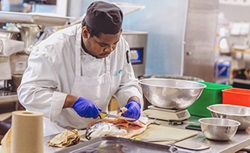
From rivers filled with oolichan and salmon to trails lined with shrubs of all kinds of berries, this region is rich with food that the First Nations people have been living off for centuries.
Traditional knowledge of how to harvest, prepare and serve from the wild is in an era of revival that is now being shared with Coast Mountain College through the new two-year West Coast Culinary Diploma.
“There’s such a high demand for First Nations foods across the country but there’s barely any restaurants or institutions offering it yet,” says program co-creator, and Culinary Arts Instructor and Coordinator Darlene Godfrey.
“Many people are talking about how to get traditional foods into institutions such as hospitals or school cafeterias where people are away from home and looking for their comfort foods... and there’s also a big curiosity around the world to try this food.”
She predicts First Nations cuisine will be the new food trend in the near future. So far, CMTN is the only institution in B.C. to provide such a unique program.
Working with CMTN culinary instructor Brad Vennard, Godfrey says this program’s
curriculum took years to create and to establish genuine Indigenous connections in the region. As part of the course work, students are introduced to First Nation practices by helping local communities with their annual harvests.
“We immerse our students with the culture and traditions by assisting the community through labour-intensive work... They go work in the smokehouse, out in the mountain to help hunt, fish for salmon and so on,” she explains.
“The intent of the program is to assist communities, not take away their food source. It’s a delicate process that involves elders and knowledge keepers, who will also provide guidance in our classes.”
Godfrey says she’s looking forward to teaching students about the importance of food sustainability and using local products. By immersing themselves in First Nations
cuisine, she wants students to learn how to be creative with seasonal ingredients.
“There are lots of barriers that we have to knock down to teach students how to
properly prepare this cuisine,” she says, adding she hopes that the hands-on process will help students gain a greater cultural understanding of the region and the world.
“Food is such an emotional experience for so many people, it doesn’t matter where you are... When we all sit down for a meal and talk, we see each other as human beings. Food brings us together.”